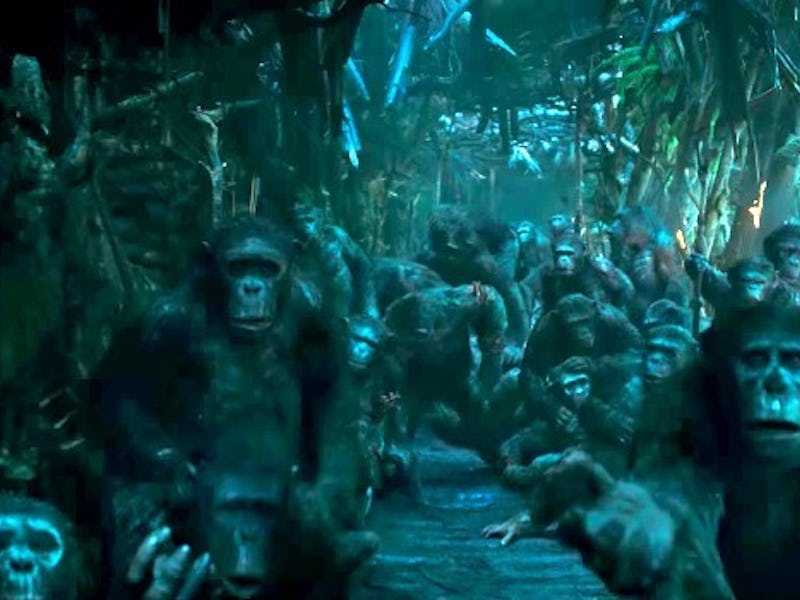In War For the Planet of the Apes, humans and apes alike are living in fear. Most of the human population has been killed by the simian flu, and those who remain are hell-bent on destroying the intelligent apes that got an evolutionary leg up from the virus. To survive, apes across species — chimpanzees, gorillas, bonobos, and orangutans — form an alliance, united under a single rallying cry: “Apes together strong.”
Is it realistic to think that different species of apes could work together? According to Rebeca Atencia, the lead veterinarian and head of the Tchimpounga Chimpanzee Rehabilitation Center, founded by the Jane Goodall Institute in the Republic of Congo, that scenario isn’t completely science fiction.
“Primates are social in nature, and have been documented to be altruistic, especially in a reciprocal situation,” Atencia tells Inverse.
“What that means is, great apes work together for a common good, goal, or in ways that benefit both parties, and it is not out of the question to think this would extend to other species.”
Atencia admits that there isn’t much documented evidence of chimps working together with other primates — either great apes or non-great apes — but that doesn’t mean the scenario should be ruled out altogether.
“Chimps very much cooperate with individuals outside their particular kinship group and do build bonds with humans,” Atencia points out, “so it is possible that if two separate great ape species were brought together, they could work together. We just don’t know.”
What’s slightly more well studied is the idea that chimps can be altruistic to each other within populations and form coalitions, as research conducted by the Jane Goodall Institute in Tanzania has recently shown. Two studies, published as a pair in the journal Proceedings of the National Academy of Sciences in June, also showed that chimpanzees work together in an unexpectedly altruistic way.
In one of those studies, scientists found that chimps will work together for the collective good of the group, even if those chimps are not related. This is surprising from a biological point of view, because it isn’t consistent with the idea that an individual only cares about its kin (and therefore the proliferation of its own genes). The researchers call this behavior “group augmentation,” which suggets that the chimps understand that a little sacrifice from every individual member result in greater safety and stability for the overall group. In the other study, scientists showed that chimpanzees will return favors to other chimps who have helped them in the past, even if this means they’ll get less food this time.
Despite the limited research on the topic, Atencia has reason to believe in chimp altruism. She’s seen, first-hand, that chimps can form emotional bonds with other apes — namely, humans like herself. “In a pretty miraculous moment in my life, I was saved from what could have been death from a hostile group of chimpanzees by a single chimp who remembered me as having treated his wounds prior,” she says. “The connection we had was most formed through eye contact, very nuanced, and very amazing.”
It’s suggested both by the Planet of the Apes films and by scientists studying human psychology that moments of altruism, like Atencia’s extraordinary experience, are influenced by emotions. In human psychological research, it’s believed that certain positive emotions, like joy, promote altruistic tendencies. And, in War for the Planet of the Apes, Caesar’s intense emotions are a plot point of the film.
“You are impressive,” says Woody Harrelson’s Colonel to Caesar, who has led the group of “apes together strong.” The Colonel is the film’s ape-slyaing villain. “You’re smart as hell, you’re stronger than we are, but you are taking this all much too personally. So emotional!”
Of course, we can’t draw definitive parallels between human emotions — and their effects on behavior — with the way that ape emotions affect ape behavior. Chimps have feelings and unique personalities, says Atencia, but it’s impossible to know for now whether they are the same emotions that humans feel.
“Having spent almost every day for years with a group of 150 chimps, I can say that they are indeed emotional,” says Atencia. “They have a broad range of emotions, but their emotionality is exclusive to their existence as chimpanzees, versus our own as humans.” Apes may be together strong in real life, but science has a ways to go before we can fully understand why they are united.
